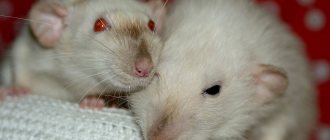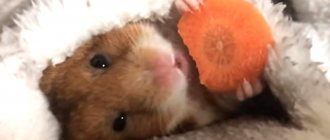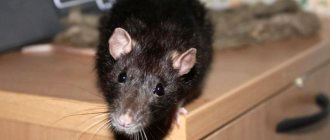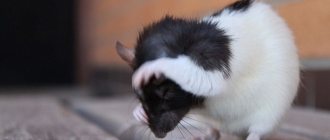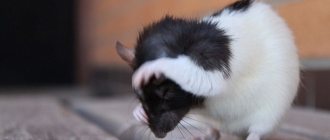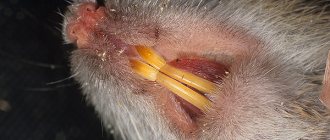Rats are considered quiet animals, but this is far from the truth. They can make a wide variety of sounds, which often impress people.
Pet rats make all sorts of noises that can sometimes sound a little strange. With these sounds they try to let the owner know about something: joy, anger, irritation or poor health. As a rat owner, it is very important for you to know the difference between these noises. This will help you understand your pet better.
What sounds do domestic and wild rats make?
Rats have been found to make a combination of sounds depending on how they are feeling or what is happening to them.
Just like us, pet rats sneeze, cough, hiss, wheeze and hiccup from time to time. But these sounds can mean different things. For example, wheezing and coughing signal health problems that can quickly become life-threatening if not treated promptly and properly.
If you listen carefully, you can understand what your rat is telling you. Let's find out more about what sounds rats make and why.
- Hiss
Hissing is an aggressive sound that a rodent owner may hear during particularly stressful social encounters, such as introducing a new rat into another pet's cage. In most cases, the hissing is what you'll hear before the fight starts, so be prepared to intervene safely if necessary.
Important: Never handle a hissing rat without thick gloves or a towel, as there is a chance that the animal will attack you.
- Squeak
A short squeak can be heard if you accidentally startle the rat by trying to pet it or in some other way. You may also hear a similar squeak when rats are grooming each other or communicating in a friendly tone.
Rats most often squeak as a sign of fear or minor irritability, but not when they are in pain or in immediate danger.
A prolonged squeak is usually the sound of a rat's protest. The owner can hear a similar squeak when the rats are playing and one of them requires rest. If you hear this sound and none of your rats appear sick or injured, it simply means one of the pets needs a break.
- Whistling
A rat can make a long throat whistle if it needs attention and affection from its owner. But a loud whistle may mean that males are calling females to mate.
- Grinding teeth
Because rodents' teeth constantly grow throughout their lives, it is extremely important that the rat grinds its teeth frequently to maintain optimal tooth length. If your rat's teeth are too long, it can lead to a variety of difficulties, including interfering with his ability to eat, wash himself, and even cause excruciating pain. Overgrown rat incisors can cause ulcers and other sores in the rodent's mouth, and misalignment of the jaws prevents them from closing properly. But don't worry. Unless your rat suffers from deformed jaws due to their genetics or a birth defect, there is no reason to worry about your pet's teeth.
In fact, teeth grinding in rats involves more than just maintaining the correct length of the incisors. They often chatter their teeth when they experience strong emotions such as fear and stress, as well as happiness or overall satisfaction with life. So don't be alarmed if your rat starts grinding its teeth when you pet it. This doesn't mean she's stressed, it means she's enjoying herself, feeling relaxed, calm and safe.
Some studies even show that tooth rubbing in comfortable and enjoyable situations in rats is similar to the purring of a cat. Just a way to show my appreciation to you.
- Chirping
When threatened, a pet rat usually makes a chattering sound. Check the area around your pet for dangerous objects or other animals.
A few more reasons for squeaking
Any owner of a decorative rodent should definitely know the meaning of such signals, but it is also important to be able to understand the intonation and situational context of the squeak:
- when your pet squeaks while stroking it, you should suspect the presence of a wound, touching which causes pain;
- the rat is probably happy and in a good mood if in the owner’s hands it squeaks quietly or tries to lick your hand;
- young rodents often squeak, expressing delight at the fun and games of their fellows;
- a squeak can also indicate fear, especially if such a squeak is abrupt and loud. Most likely, the rodent sees danger, for example, a sneaking cat, and calls the owner for help;
- when an animal is picked up and at the same time it makes a squeak, then the rat may be unhappy with being disturbed.
Whether rats squeak in pleasure or pain, they want to be understood. Rat language, varied and interesting, is easy for every caring owner to master. To do this, you just need a little sincere attention, which will certainly be appreciated by your little ward.
Sources:
https://animallittle.ru/zvuki-domashnih-krys.html https://nutriacultivation.ru/archives/9117 https://moy-homyachok.ru/domashniaya-krisa/pochemu-krysy-pishhat.html
What sounds indicate health problems?
In most cases, wheezing sounds are a sign of advanced lung disease or respiratory infection. Successful treatment of wheezing requires an environment free of dust and contaminants, as well as immediate contact with a veterinarian who will prescribe the necessary antibiotics.
Wheezing in rats is also a sign or symptom of a respiratory infection. Sometimes this is due to an exacerbation of mycoplasma. Almost every rat will develop some form of respiratory disease during its life. In fact, mycoplasma infection can be mild or very serious. This is where antibiotics come to the rescue.
Grunt
The rat often makes sounds that are similar to grunting from pleasure when communicating with the owner or receiving a favorite treat from him. However, grunting sounds for these rodents are not the norm, since they most often occur if the animal has rhinitis, pneumonia, heart problems or a deviated nasal septum.
If such a condition appears, it is better to show your pet to a veterinarian and make sure that his life is not in danger.
Important! Grunting sounds combined with shortness of breath, whistling, convulsions, blanching of the ears, blueness of the tip of the tail and paws are produced by dying rats. In this case, the animal needs to be given first aid - give a few drops of Corvalol, and then take it to the doctor.
Coughing and sneezing - is the rat sick?
The vast majority of rats rarely cough. However, their cough is usually a consequence of shortness of breath or difficulty breathing. Some rats cough when they are choking, which often causes them to jump back and forth. This causes their throat to feel sore, so they may choke if they eat too quickly. Therefore, the rat needs to be taken to a veterinarian for an examination.
Decorative sphinx rat is sick
Some rodents may also sneeze. This happens for a variety of reasons. So let's look at some of the most common cases.
- Rat sneezing due to illness
Constant sneezing is often a sign of illness. If this is the case, you will notice symptoms such as poor appetite, changes in activity, wheezing, and discharge from the nose and eyes. These accompanying symptoms are usually accompanied by general weakness or discomfort.
- Sneezing caused by allergies
Many rats are prone to developing allergies under certain circumstances, so this shouldn't surprise you. How to recognize this?
Just like humans, rats can have different allergic reactions to different things in their environment.
When rats have allergies, they sneeze at different times quite often. If your pet recently started sneezing, and you recently changed his bedding, food, or added new items to his rat cage, they most likely caused the allergy.
- Sneezing due to new scented oils, candles, air fresheners and pets
All of these can cause sneezing. A new animal, such as a dog or cat, can cause a similar reaction when introduced into a rat's environment. While rodents may quickly become accustomed to new animals in the home, they may never become accustomed to these odors in the air.
The same goes for air fresheners, oil warmers, oil diffusers, candles, incense and wax melts. All of these can irritate the rat's respiratory system and make it feel nauseous. But not all rodents are easily irritated.
Essential oil diffusers are growing in popularity these days. Although they may have therapeutic effects on people, be careful when distributing these oils. They are not recommended because the respiratory system of pet rats is quite fragile, which increases the risk of adverse reactions.
Diagnostics
Although definitive diagnosis is difficult, mycoplasmosis is very common and well recognized in rats. The presumptive diagnosis of mycoplasmosis is usually based on characteristic clinical signs.
- Survey radiographs
X-rays can usually be performed without sedating or anesthetizing the pet rat. Get two views, as with other mammals. Assessing lung lesions can help determine prognosis and monitor response to therapy.
- Bacterial culture and sensitivity testing
Collecting in-depth diagnostic samples from pet rats may not be possible, although some clinicians will submit respiratory secretions for analysis. Mycoplasma spp. difficult to isolate because it cannot be grown by conventional cultivation methods.
- Blood analysis
A general blood test will help determine the degree of the inflammatory process.
Can a rat scream?
The cry of a rat is similar to a long squeak, only much louder. This is often a sign of extreme disapproval or fear. If you introduce rats to each other, one of them may scream, especially if it is much younger than the other. Young rats are still learning hierarchy and social skills, so they will often scream when confronted by an older, dominant rat if they don't know what else to do.
If you hear screaming from a rat cage, you need to assess the situation. If it looks like one of your rats is cornered or abused, you will need to separate them and try the introduction later.
The rat is panting (opening its mouth, wheezing or grunting when breathing)
Usually, in moments of pain or fear, the rat squeaks loudly and shrilly.
First of all, the owner must inspect the area around the cage and understand what could have caused the fright.
If there are several rodents in the house, and one of them begins to squeak loudly, the owners need to examine the pet for injuries and bites. It is also advisable to separate him from his relatives for a while. If your pet continues to squeak, you should take him to the vet, as he may be suffering from severe pain as a result of damage to internal organs.
A loud and abrupt squeak from a rat when it is pulled out of its cage means that the animal is not in the mood to communicate with a person.
If the tailed pet squeaks quietly when stroking it, the owners can rest assured - the rodent is currently enjoying communication with the owner.
The rat makes strange noises: what should I do?
Rats are usually silent creatures, but in some cases you may hear noise from your pet. When rats are babies they can be quite loud, but this completely stops as they grow up. Rodents can also make noise when playing, fighting, or in pain, but these are very recognizable high-pitched squeaks. Rats also make a unique yet pleasing sound when they grind their teeth to keep them sharp. Not only does this serve a practical purpose, but it is also a sign that they are happy.
If your rat makes any sounds other than these, there is cause for concern. They are susceptible to respiratory infections, and even a healthy rat can develop serious health problems. A proactive visit to a veterinarian experienced in rodent care will either confirm that your rat is healthy or provide it with the necessary treatment to live a long and fulfilling life.
Behavioral features
Rats detect any changes in the owner's voice, so raising your voice or using brute force for punishment is not acceptable. A frightened animal will become downtrodden and wild.
Try turning the guilty rodent onto its back. In nature, such punishment is used by the leader of the pack, so the rat realizes guilt and is filled with respect.
The only punishment for a rodent is to turn it into a subordinate position.
With a good attitude, the pet becomes imbued with love and begins to show talkativeness (coos, chirps, grunts). But even in this case, all sounds have their own interpretation and contain an obligatory subtext.
Posts 1 page 16 of 16
Share12012-08-21 15:07:38
- Author: Coma white
- Participant
- From: Sevastopol
- Registered: 2012-08-12
- Invitations: 0
- Posts: 50
- Female gender
- Time spent on the forum: 15 hours 39 minutes
- Last visit: 2012-08-28 10:52:32
Hello. The problem I have is this: yesterday I took an adult rat (a boy) from my friends; his age is unknown, since he has been wandering from hand to hand all his life. They kept him poorly, they fed him with something unknown, and the last owners even believed that the rat did not need water, instead of bedding with newspapers. In general, the trouble is that the rat looks healthy outwardly, the only bad thing is that it grunts, similar to the sounds that guinea pigs make, especially when it eats or sniffs something. In general, I can’t take him to the vet yet. the next couple of days, what can be done during this time?
